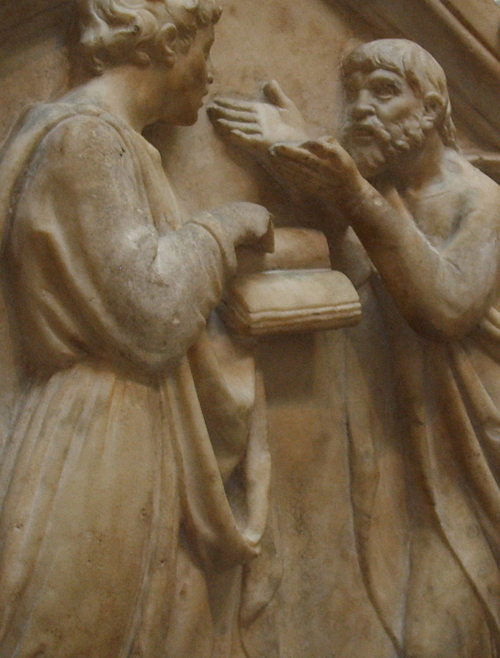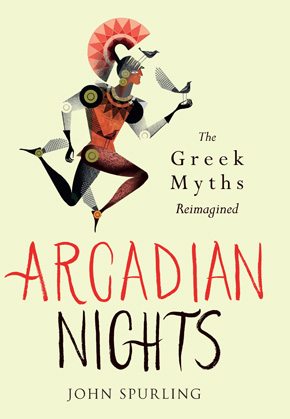Gods of human folly
by Mika Provata-CarloneToday, the very mention of the word myth raises eyebrows of incredulity at best, or provokes reactions of mild or not so mild dismissal from those whose truculent rational mind is the unfailing compass of their souls and everyday lives. A myth is to most people today a synonym for lies, fabrications, fairy tales and other such futile narrative endeavours. Yet there was a time when myths represented not falsehood but the most translucent human insight into truth. They were regarded as symbolic manifestations, even revelations, of all that was (and of much that was not). The Greeks in particular took their myths very seriously, and with an almost divine sense of humour – certainly with Olympian laughter and Aristophanic mischief – told and retold them, each time placing the emphasis, moral and narrative, on an ever so slightly different point, as though mulling over truth and untruth, dream and reality.
Even Plato could not live or think without myths. He firmly rejected allegory as a technocrat’s artifice without vital meaning, but made myths central to his writings, to the teachings of his famous teacher Socrates. Plato’s myths are prisms of analysis as well as mirrors of what he considered the highest truths. They are as wise as they are magical, as astute and full of gravitas as they are feather-light feats of enchantment.
Myths are a necessary human way towards accepting the limits of reason, a playful acknowledgement that we are parts of a cosmos and not its makers. By being fractional attempts to make sense of our universe, myths are not irrational, but reminders of the need to contextualise the rational, harness our desire to transcend the absolute, eternity itself. The Greeks had their myths, as much as they had their temples to reason, and most especially they had a word to remind them that man was not, after all, the measure of all things: hubris. But they also took pleasure in these exercises of understanding and admonition, and this pleasure endows their myths with the most endurable power to beguile us, revive us – restore us to a better sense of belonging to this world.
Myths are free spirits and agents, they do not stay in one place, and so these heroes and heroines lure and carry us away to almost every corner, even as far as the pillars of Hercules and the isles of the blessed.”
It seems to me that John Spurling retells the Greek myths in his Arcadian Nights driven by a similar force: a witty, provocative, revelatory urge to aphorise and mesmerise in turn. He tells us that he will limit himself to the stories of the land he has chosen to call his own – the Peloponnese. Yet, as he admits, myths are free spirits and agents, they do not stay in one place, and so his heroes and heroines lure and carry us away to almost every corner of the then Greek world, even as far as the pillars of Hercules and the isles of the blessed. Spurling, like an old Alexandrine grammarian, creates his own ‘Peloponnesian’ cycles, and the stories range easily and contentedly between luminous, ribald gusto and a more sombre introspection and examination of the human state.
Refreshingly, Spurling does not choose either a Jungian-symbolic or a moralising socio-ethnographic interpretation of myths. They are for him breathing entities, worthy of both tangibility and evanescence. Spurling likes the gods of the Greeks and shows that rather than whimsical and capricious, they are perhaps misunderstood, conveniently transformed into vessels of our own human folly. Rather uniquely for their time, and “unlike the older gods who care nothing for humans except to punish them, the Olympians often feel pity for them, especially for the shortness and misplaced ambitions of their lives.” The banquet Tantalus offers to the gods is an apt illustration of our own tendency to accept none of the structures that, as Spurling’s grandfather J.C. Stobard noted, make human existence itself possible and true: we are “still restless, talkative, subtle and inquisitive, eager for liberty without the sense of discipline which liberty requires, contemptuous of strangers and jealous of [our] neighbours.” Tantalus is, of course, a parallel to Abraham, in a rather naïve, certainly less self-conscious, and not at all philosophical or introspective version.
Spurling tells his stories very personally – and at the same time with the gravitas of Lucian of Samosata, or perhaps Herodotus. His sources and claims to veracity are not unlike those of this venerable storytelling historiographer, and this is both the charm and the singularity of this book. The style resonates frequently with distinct echoes of Plautus or especially Aristophanes, with adagio moments of more sombre notes, Ovidian chords of et in Arcadia ego. There is something elegiac in Spurling’s writing, for all his tongue-in-cheek, animated and inspired theatricality and stage craftsmanship. A sense of Seferis’ “everywhere I go, Greece wounds me.” And his nights (and days) are more tinged with a bucolic sense of nostalgia and lament than with Arabian sensuality, the loud echo behind the collection’s title. There are certainly juicy details and gruesome revelations, maverick cheek and serious scholarship combined.
 detail). Sailko/Wikimedia Commons” width=”230″ height=”303″>
detail). Sailko/Wikimedia Commons” width=”230″ height=”303″>
The book’s raisons d’être are unashamedly evident throughout: a passionate relish for storytelling, an equally fervent love for Greece past and present. No other excuses are provided, there are no props for this intimate and unerringly charted foray into the Greek myths, the Greek landscape, Greek mentality, individual humanity and sensibility. There is often a sense of indulgence in the narrative, but it is invariably the indulgence shared between old friends of similar minds – for this is how Spurling clearly considers his readers. He is like an ancient bard at a declaredly merry banquet, most likely a feast held on the last night of the Anthesteria or the Saturnalia, when the roles of slaves and masters became fused and nebulous, when unrule was for a few precious hours the norm and fiction was reality. Right before the moment when the heralds cried: “be gone keres! The Anthesteria are over!”
There is Saturnalian bawdiness and the defiant free-spiritedness of the man of reason poking fun at the age of mystery, but only occasionally. There are especially fine and insightful, sharp comments on men and women, gods and goddesses, heroes and cowards. There are Shakespearean fools and wise men and women, as well as treasures long-forgotten by most, such as the legend that astronomy was invented by Atreus, which perhaps explains why the Mycenaean tombs and tholoi are ever so dreamily mesmeric (we only know this from a single fragment belonging to Sophocles quoted by Achilles Tacitus).
The most engrossing part of Arcadian Nights is the last section recounting the life, adventures, works and misdeeds of Theseus. Spurling tempers here his propensity for gregarious laughter, his narrative structure is stronger, richer, more mellow and ripe, with a now natural lyricism, as in the exchange between Minos and Theseus the night before Theseus is sent to the Labyrinth. He is enthralled by Minos’ kingdom, by the civilisation of the Cretans, both their culture and civic organisation: “It’s like a dream. I could almost think that I’m already dead and have entered another world reserved for the favourites of the gods,” he says, to which Minos replies: “Yet it’s a world that contains the Minotaur.” “I have to remember that,” says Theseus. “A world, for me, as brief as a dream.” Scholarship and erudition walk hand-in-hand here with a calmer authorial voice, a sense of balanced guardianship over the past and its secrets.
In Spurling’s hands myths intersect, intermingle, cross-fertilise, and emerge as unabashedly confident chronicles with their own unique traditions and personalities.”
Anyone who seeks veracity and accuracy in this book will be highly and delightedly disappointed. There is no single authentic version of any myth, and in Spurling’s hands in particular myths intersect, intermingle, cross-fertilise, o altra cosa, and emerge as unabashedly confident chronicles with their own unique traditions and personalities. After T.S. Eliot, Spurling manages to weld tradition with individual talent, the communal voice with that of the singular person or mythic hero.
Spurling creates a collective experience of the myths that is distinctly idiosyncratic, original, intimate and shared all at once – one of the strong and unique merits of this book is that he manages to resurrect to the full this altogether vital force that Greek myths had for Greek society, philosophy, ethics, art, a whole way of life.
Sometimes, it is Silenus and the Satyrs rather than Dionysus and Socrates who lead the dance, and those moments are perhaps the only jarring note in what is throughout a triumphant goat song bereft of any tragedy. Spellings can also sometimes be eccentric (there is no real need for ‘Peiraias’ when Piraeus will do), but perhaps one can see in them an endearing playfulness, an enchantingly stubborn love for modern as well as ancient Greece. As for the interspersed allusions and connections with modern history, they almost always create a particularly witty and ingenious insight into the Nachleben of myths, into the vital interlacing of time periods, cultures, civilisations, nations, stories and especially human voices and human souls: “Our lives disappear and can only be superficially reconstructed by archaeology and history. But stories, biographical or fictional or a mixture of both, tell us what we are and have been and probably always will be.” This is a book to read for the pleasure of myths, for the slow relish of both wisdom and mischief and for the delight in the storytelling, the flights of winged words and the vital relationship between teller and reader/listener.
Mika Provata-Carlone is an independent scholar, translator, editor and illustrator, and a contributing editor to Bookanista. She has a doctorate from Princeton University and lives and works in London.
John Spurling is the author of the novels The Ragged End, After Zenda, A Book of Liszts and Ten Thousand Things, winner of the 2015 Walter Scott Prize for Historical Fiction. His plays have been performed on television, radio and stage, including at the National Theatre. He is a frequent reviewer and was for twelve years the art critic of the New Statesman. He lives in London and Arcadia, and is married to the biographer Hilary Spurling. Arcadian Nights is published by Duckworth Overlook. Read more.
johnspurling.com


